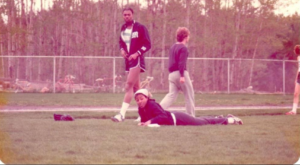As an athlete, I am my biggest critic.
It’s game day. You go through warmups, they announce the starters, the whistle blows, and it’s time to play. Time to show the other team and the crowd what you are made of. It’s time to prove yourself. You watched the film and you had a great week of practice. Now it is time to show up and show out. You have done everything to be as prepared as possible. Then BOOM, you make one mistake.
Then another.
And another.
Soon you are overthinking every aspect of your game. At that moment you have lost it. “It” is that pure athletic instinct that allows you to play freely. “It” is your automatic, autopilot ability to perform at your best. Every athlete has experienced this moment. When things get tough in a practice or a game, you make a couple of mistakes, and then all of the negative thoughts creep in.
That focused competitive energy that is necessary to help get your team a win has now turned into self-doubt and insecurity. You start critiquing every little thing you do, and you are no longer relying on yourself or your instincts to perform at the level you are capable of performing at. In the end, only one thought is stuck in your head.
I Suck.
A great way to move past this slump is to FORGIVE yourself, learn from your mistakes, and LET GO. It is so destructive to your mental health and your game for you to hold on to these negative experiences. You cannot dwell on the past, and more importantly, you cannot feel sorry for yourself.
A 2013 study found that self-compassion can greatly benefit performance athletes (Mosewich et al., Applying Self-Compassion in Sport). Today, we’re going to teach you how to practice self-compassion when self-criticism creeps in.
There are three components of self-compassion:
The first is self-kindness.
This involves being understanding and accepting toward oneself instead of being judgmental when you start making mistakes.
One way to implement self-kindness is to express kindness and concern to oneself in the same way you would express concern to a friend. In a journal, write down what occurred to make you doubt yourself. Then write a response as if you were helping a friend. As you write that response, free your mind of those negative thoughts and allow the weight of those negative comments to be lifted off your shoulders. As you read your final journal entry, you’ll see how hard you were being on yourself and how unnecessary it was.
Most importantly, once you have finished reflecting, you have to let it go. It always helps to do something nice for yourself. Shop a little on Amazon, make your favorite dessert, throw on your favorite TV show, and relax.
Embrace it, learn from it, and move on.
The second is common humanity.
This is when you recognize that what you are experiencing and feeling is normal and that you are not alone. If you are struggling, it is okay to admit that and ask for help.
If you feel alone, reach out to a teammate, watch a documentary, or read an article or a book about sports. As an athlete, those chills and feelings of excitement you get after watching The Last Dance or Remember the Titans help you remember why you love your sport so much.
Sometimes you just need to see other athletes go through similar struggles in their sports and witness them overcoming those challenges to come out on top. This will help you feel connected to the world because it will remind you that you are not the only one who has faced the struggles you are facing right now. There are so many resources out there that are available at your disposal, and there are people who are willing to help you. Do what’s best for you so you can be your best self and perform at your highest level. Remember, there is more to sports than your physicality – your mental headspace must be taken care of, as well.
The third is mindfulness.
This involves finding your “center”. It is important to be aware of your thoughts and feelings instead of denying and suppressing them. Doing so will help you manage your expectations, and help you make decisions that balance both your mental health and athletic performance.
Take a moment to write down your emotional response to a difficult situation you’ve been in. Think about why you felt that way. There is only so much you can control in difficult situations, however, your emotions are one of them. The next time you experience negative emotions, try to observe them without attaching to the narratives they’re associated with. Allow yourself to feel disappointment without self-criticism. Allow yourself to feel sadness without giving in to thoughts that overwhelm you with darkness. By practicing mindfulness, you are more likely to maintain mental stability when you find yourself in a tough situation again.
Now that you understand the three components of self-confidence, it is time to try and apply them to your own life!
Dr. Kristen Neff’s website is a great resource to better understand the concept of self-compassion. Being the first to “operationally define and measure the construct”, she developed a program to implement self-compassion in daily life. Some of these programs involve journaling, guided meditations, and physical touch therapy to help people feel connected to themselves.
These are also great books to read that go more into detail about self-compassion:
Self-Compassion: The Proven Power of Being Kind to Yourself – Kristin Neff
This book offers expert advice on how to limit self-criticism and offset its negative effects to help you achieve your highest potential and find more contentment in life.
50 Mindful Steps to Self-Esteem: Everyday Practices for Cultivating Self-Acceptance and Self-Compassion – Janetti
This book applies ancient wisdom to complex, modern-day living in this well-written and heartfelt guide for cultivating self-compassion and acceptance.
Dearest Friend: A Mindful Self-Compassion Guide and Journal for Exploration, Reflection, and Healing – Baylissa Frederick
This workbook offers powerful healing tools for those who struggle with self-love and self-compassion.
Another great resource is mindfulness apps! They are easily accessible and you can pick the one that fits you and your needs the best.
Those who are able to be self-compassionate are able to acknowledge and evaluate their mistakes and weaknesses without excessive self-criticism, allowing them to effectively focus on their goals (Mosewich et al., Applying Self-Compassion in Sport). None of this is easy, but it is up to you to change your mindset. You already took the first step by reading this blog!
You are more than just an athlete so make sure you cater to the human part of yourself as well.
Finally, always remember that you are loved, you are appreciated, and you are beautiful.






